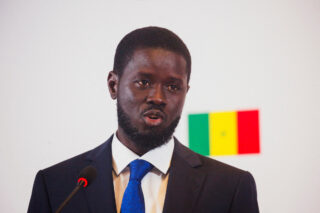On Sunday, March 24th, Senegal held its presidential elections. Bassirou Diomaye Faye, 44, is set to be declared winner. But his rise to the presidency is the biggest plot twist in this build-up. Just ten days before the polls, Faye was still a prisoner in the Cap Manuel prison on the southern outskirts of Dakar. A few months ago, he was a relatively unknown figure outside his opposition party, PASTEF. Authorities had dissolved PASTEF in 2023, three months after Faye’s arrest. But now he will reside in the Senegalese presidential palace for the next five years as the country’s youngest-ever head of state.
According to official results from the National Vote Counting Commission on Wednesday, March 27th, Faye won with 54.28% of total votes. His main opponent, Amadou Ba, had 35.79%. The rest trailed much further behind.
Faye’s opponents have already conceded. “In view of the trends in the results of the presidential election and pending the official proclamation, I congratulate President Bassirou Diomaye Diakhar Faye on his victory in the first round,” Amadou Ba said. Shortly afterwards, President Macky Sall sent his congratulations on Twitter (X).
Years of political turmoil have left the West African state’s democracy teetering on the brink of collapse, with deadly uprisings and the jailing of opposition figures commonplace. In February, Sall made the nation jittery by suddenly postponing the elections. It took protests and the intervention of the Constitutional Court to reverse that decision. But Faye’s victory has left the population, particularly its youth, energised by his promise of radical change.
Everything changed for Faye when his party’s charismatic leader, Ousmane Sonko, who was also detained, was charged with insurrection in July and barred from running in elections to succeed President Macky Sall. He was a “plan B” designed to compensate for Sonko’s announced absence. And he wasn’t the only one to play the role of alternate candidate, as Sonko had also sent Cheikh Tidiane Dièye and Habib Sy to file their candidacies to ensure his ideas would be represented.
However, Faye became the popular choice for being the closest substitute to Sonko. This birthed the slogan: “Diomaye moy Sonko, Sonko moy Diomaye” (“Diomaye is Sonko, Sonko is Diomaye,” in Wolof) chanted among the party members. The slogan was their way of making Faye popular among the nation. And it worked. On the evening of his release alongside Sonko (thanks to a last-minute amnesty law), the crowd chanted the slogan in unison. It was the start of 10 short days of electoral campaigning for a candidate who had never before been elected.
Faye pitched himself as a pan-Africanist intent on steering Senegal toward economic sovereignty and away from French colonial relics such as the West African CFA franc, a currency pegged to the euro. He has also pledged to overhaul the government, weed out corruption and increase transparency. At 44, Senegal’s youth regard him as a relatable figure whose values have been informed by a traditional village upbringing and a devotion to Islam.
Not everyone agrees with his left-wing populist ideologies. Pastef’s critics condemn the party for promoting what they say are reckless policies that could sink Senegal’s economy, most notably its budding oil and gas industry, and inciting “insurrectional movements”. But the incumbent party hasn’t won confidence either.
Sall has also been criticised for prioritising foreign interests and businesses over local entities, and opponents blame him for high youth unemployment rates and a related migration crisis, which has reached record highs in recent years. More than 60% of Senegal’s population is under 25 years.
More so, Sall’s popularity among Senegalese youth sunk to new lows during his second term when he began jailing opposition members. His ambiguous stance about whether he would step down at the end of his mandate fuelled violent clashes between protesters and gendarmes. More than 60 people have died in protests since 2021, according to rights groups.








